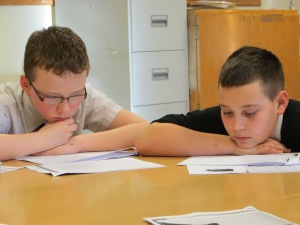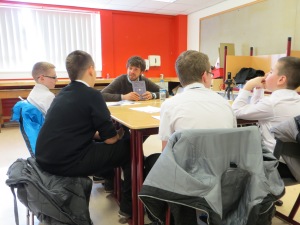 A new study has found that children who regularly read for pleasure are more likely to perform significantly better in school subjects than their peers who read less.
A new study has found that children who regularly read for pleasure are more likely to perform significantly better in school subjects than their peers who read less.
The research by the Institute of Education at University of London is the first study of its kind to examine the effects of reading for pleasure on the cognitive development of children over time. Researchers discovered that children who read for pleasure made more progress in maths, vocabulary and spelling between the ages of 10-16 when compared with those who rarely read. The reading behaviour of 6,000 young people was analysed, as were the test scores of children from the same social backgrounds at ages 5 and 10. The study discovered that children who read books often at age 10 and more than once a week at age 16 gained higher results in all three ability tests at age 16 than those who read less regularly.
Perhaps the most surprising discovery of the research is that a child’s own reading for pleasure was found to have a greater effect on cognitive development between the ages of 10-16 than their parents’ level of education. The effect of reading books often paired with going to the library regular and reading newspapers at the age of 16 made four times the difference to progress in school than the advantage gained from having a parent with a degree.
Dr Alice Sullivan, one of the researchers who carried out the study, noted:
“It may seem surprising that reading for pleasure would help to improve children’s maths scores. But it is likely that strong reading ability will enable children to absorb and understand new information and affect their attainment in all subjects.”
 All of The Reader Organisation’s projects with children and young people are focused on reading books for pleasure. We work both in schools in Liverpool, Wirral and Scotland fostering a love for reading, as well as in one-to-one sessions within and outside of the classroom. Our aims are to develop a life-long love of reading for pleasure in children and young people and to create a culture of shared reading amongst parents, carers and teachers. We’re developing a reading for pleasure revolution with teachers of the future at Liverpool Hope University, so the news that reading for pleasure makes a real difference to pupils is something we’re welcoming.
All of The Reader Organisation’s projects with children and young people are focused on reading books for pleasure. We work both in schools in Liverpool, Wirral and Scotland fostering a love for reading, as well as in one-to-one sessions within and outside of the classroom. Our aims are to develop a life-long love of reading for pleasure in children and young people and to create a culture of shared reading amongst parents, carers and teachers. We’re developing a reading for pleasure revolution with teachers of the future at Liverpool Hope University, so the news that reading for pleasure makes a real difference to pupils is something we’re welcoming.
Many of the children and young people we read with on a regular basis have gained a number of positive effects from regular reading for pleasure. W, a looked-after child with learning difficulties is just one of them:
When I first started reading one to one with him, his reading ability seemed so low that I felt concerned about finding a book that would be appropriate for his age as well as his ability. As it happened, in our first meeting I had taken the book Skellig, by David Almond, which I had almost written off as being too difficult for him. However, he liked the cover, so I thought, well, let’s give it a go. I started reading it to W, and almost immediately, he was hanging off every word. He was just soaking up the story, and watching my face – I wondered if he had ever been read to before.
We have a reading ‘trick’ now, where W, when he is reading, follows the words with his finger and taps under words he doesn’t know. I then whisper the word to him, and he repeats it and continues with his reading. His reading is getting better and better, and his vocabulary is widening – but what is more important in our sessions is his enjoyment of the book. W is expressing more and more feeling and thought through the book.
W’s story shows that not only does reading for pleasure have an measurable effect on ability and comprehension, but it is first and foremost a fun and enjoyable activity that enhances a child’s confidence and brings out more of themselves.
Read W’s Reader Story in full, along with others about some of the children and young people we read with, on our website, where you can also discover more about our projects in education settings across the UK.